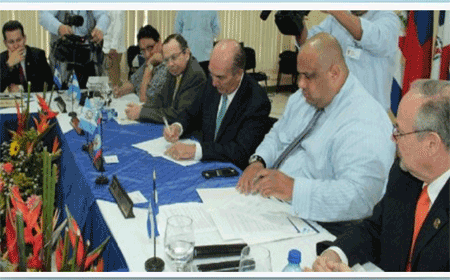BELIZE CITY, Tues. May 24, 2016–Leaders of Parliaments of Central America, with the exception only of Panama, inked a new peace accord, saying that they will encourage the Congress of Guatemala to promptly consider the ratification of a protocol which the Foreign Ministers of Belize and Guatemala signed a year ago, on May 25, 2015, agreeing to changes to the special agreement between the parties to have their territorial differendum submitted for a binding resolution to the International Court of Justice (ICJ), pending popular votes by citizens of both countries to support the move.
The amendment to the ICJ compromis was signed before Jimmy Morales was elected to presidential office in Guatemala. Plans to hold a Congressional vote on the ICJ protocol—which Guatemala had said would have been necessary for the country to hold a referendum on the ICJ simultaneously with its presidential election in 2015 but ahead of Belize—never materialized due to instability in Guatemala.
An entire year later, the Guatemalan Congress has still not been asked to vote on the matter, although it did move recently to pass a declaration calling on Guatemalans to boycott Belize.
The Managua Declaration, which calls for Guatemala’s Congress to expedite its decision on the ICJ protocol, came following the 18th Extraordinary Meeting of the Forum of Presidents of the Legislative Bodies of Central America and the Caribbean Basin (FOPREL).
Hon. Michael Peyrefitte, Speaker of the Belize House of Representatives, told Amandala that in early May, his Guatemalan counterpart, Hon. Mario Taracena Diaz-Sol, Speaker of the Congress of the Republic of Guatemala, had asked for an audience with him.
Peyrefitte said that the invitation presented an opportunity for FOPREL to instead call an extraordinary meeting to deal with the issue, marking the first time that the regional parliamentary body has put the Belize-Guatemala matter on their agenda.
Peyrefitte said that he was “very disappointed,” to hear two days later that Guatemala’s Congress had issued a call for their citizens to boycott Belize.
“When I told him that I was disappointed about the fact that they passed that thing, he said the resolution was passed while he was in Nicaragua on a visit. He was very upset about it,” Peyrefitte told us.
On May 5, 2016, while Taracena was reportedly in Nicaragua, the vice president of Guatemala’s Congress allowed a vote which resulted in the passage of the resolution to launch an offensive campaign to dissuade Guatemalans from traveling to Belize, alleging the threat of human rights abuses by the Belize Defence Force.
Taracena’s request to meet Peyrefitte came amid flared tensions resulting from the fatal shooting of a Guatemalan minor in Chiquibul. The Government of Belize had said that the Belize military had come under fire in a nighttime operation to check illegal activities in the protected area near the border, and the soldiers, not knowing who the shooters were, shot back in self-defense. The Government of Guatemala claimed that the shooting of the minor was an act of blatant murder. Peyrefitte said that he shared Belize’s account of what had transpired and his counterparts indicated that they did not know.
Since the shooting incident, Guatemala amassed thousands of troops on Belize’s border and it had also moved to block the passage of Belizean military, conservation activists and ordinary citizens, including indigenous Belizeans, to the Sarstoon River, where Belize’s southern boundary with Guatemala lies.
“We understand fully well that none of the parliaments control the military, nor do they control the criminals who come across the border, but we wanted to commit to each other that we would not do anything to cause problems,” Peyrefitte said.
The leaders of the Central American Parliaments said, in the Managua Declaration, that they encourage Guatemala and Belize to support the ongoing peace process under the auspices of the Organization of American States (OAS), under whose auspices the parties have been engaged since 2000.
Peyrefitte said that the clause was drafted in general language but also states that an agreement could be reached through the OAS on the Sarstoon, which is not currently covered under the OAS-led process.
At the meeting, the Honourable Peyrefitte briefed the Speakers of Central America on Belize’s perspective regarding the recent incident that occurred in our Chiquibul Reserve, where the young boy lost his life.
Peyrefitte said that Taracena gave his word to FOPREL that he will very soon table a motion seeking to reverse the advisory issued by his congress against Belize.
Peyrefitte said that he asked Taracena whether he would want all Guatemalans to stay away from Belize, including the approximately 600 children who come to Belize to attend school every day. Taraceno reportedly said no — thus indicating that the stay-away campaign is ridiculous! He even was quoted in his newspaper disagreeing with the May 5 motion of Guatemala’s Congress against Belize.
Peyrefitte told Amandala that he will be writing FOPREL before the end of this month to ask them about the progress made on the Belize-Guatemala matter.
Peyrefitte is slated to assume the chairmanship of FOPREL next February.

